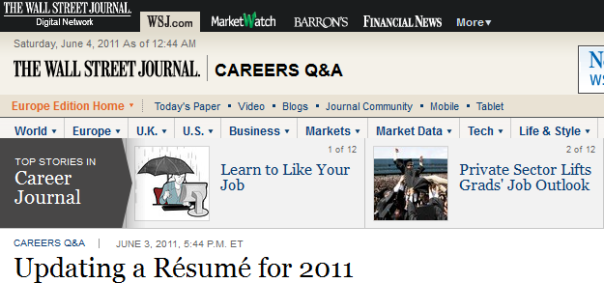On the most common mistakes made by DBAs when writing CVs/Resumes
In DBA on June 8, 2011 at 00:05
Eleanor Roosevelt said: ““People are like tea bags. You find out how strong they are when you put them in hot water.” Same holds for DBAs.
Last week, I read an article in the Wall Street Journal called “Updating a Résumé for 2011″.
It mentions about the top 10 overused terms when writing CVs/Résumés: innovative, dynamic, motivated, extensive experience, results-oriented, proven track record, team player, fast-paced, problem solver, and entrepreneurial.
How true! Having read (or rather scanned as noted in the WSJ) hundreds of DBA resumes over past years, I must say that this is very close to the reality also in the database management world.
But first, what is the difference between a CV (Curriculum Vitae) and a Résumé?About.com and Answers.com say: “The primary differences between a resume and a curriculum vitae (CV) are the length, what is included and what each is used for. A resume is a one or two page summary of your skills, experience and education. While a resume is brief and concise – no more than a page or two, a Curriculum Vitae is a longer (at least two page) and more detailed synopsis.” I see this a bit differently: it is basically the same thing. Americans call it Resume, Europeans call it CV.
Now, what are the most common mistakes made by DBAs when writing CVs/Résumés?
1. Use of cliches: Check your CV if it contains some of the words/phrases listed above. Remove them! We all know that everyone is a team player with proven track record but only one finger hits Enter after typing shutdown immediate.
2. Overbrand yourself: too much information in the CV: No need to explain in several pages what you did for every single project. Nobody has time to read all that. Really! I understand everyone wants to mention about all his skills and knowledge but forget about including technologies you have used for only few weeks or even worst: used for years but mostly on PowerPoint.
3. Including technologies you do not master well: A major mistake is to add to the CV all possible IT software and hardware you can find in Google. I doubt very much the existence of a DBA who can administer all database brands, knows all operating systems, storage vendors and is also a programmer/developer. And here I would point a finger to some employers who demand too much in their job ads.
4. Writing about old stuff: One of the WSJ article’s comments says “The problem with all resumes is that they focus on the past, not on the future”. Absolutely! I always smile when I see in the CV words like Oracle 7, Oracle Parallel Server and Forms/Reports. As if somebody really cares of how well someone masters the Rule Based Optimizer, the proper setting for gc_file_to_locks or when to use the Snap to Grid feature instead of Anchoring.
5. Unbalanced DBA skills: Few years ago, I received a CV where it read “IT skills: Internet Explorer and Oracle”. This is an extreme example but from the CV one should get the idea (for example) if the person is Senior DBA or not. For all I have seen, a typical CV is so unbalanced (see 3. above) that after reading it I am rather perplexed and bewildered of how good the DBA is and what he is most strong at. Two examples: a person is a SQL Tuning expert who has never heard of SQL Profiles or has several years of EM experience but does not the difference between Database Control and Grid Control.
6. Mimic the job ad: Déjà vu, it is so ironic when you see in the CV all you want. The worst case is when people are so lazy that they even copy/paste from my job ad. I reject these candidates at once.
7. Using DBA jargon: The one who reads your CV is not necessarily with DBA background. Too many abbreviations without explanation in brackets might lead to the frustration of the one reading it and ignoring you without cause. Even the word DBA should be avoided and use Database Administrator instead. For many people outside IT the word DBA resembles a profession from a Harry Potter book. Literally!
8. Underestimating the achievements: In the very beginning section of your CV, you want your key skills to shine out at recruiters. Include on the top of the first page what you are best at, your most significant achievements, your top skills. One paragraph! Maximum 5 bullets. That might be your keys success for getting to the interview at least.
9. Photograph in the CV: Do not put a photograph unless the employer/job ad asks for one. You may be judged based on what you wear, your hear style, how you smile. Who knows.
10. Poor Grammar and Spelling: A very recent case: strongest skill was MSSSQL 
All of the above is based on my experience and I know that DBA recruitment is often culture based. For example, in the US you cannot ask candidates about age and family status. But in Europe, these things can be at times quite important.
It is worth checking for second opinion. DBApool.com lists the 9 common mistakes in DBA resumes. It is a very good one indeed.
Another article called DBA resumes that make the cut says that “DBAs need to do more than just tell the truth” and the number one tip is “Name the same skills that the job advertisement does”. I am sorry but that is not how you get the DBA job. May be the interview but that is badly wrong advice.
You can google for generic mistakes in CVs. Opinions vary although the tendency is framed.
Source: http://juliandontcheff.wordpress.com/2011/06/08/on-the-most-common-mistakes-made-by-dbas-when-writing-cvsresumes/

No hay comentarios:
Publicar un comentario